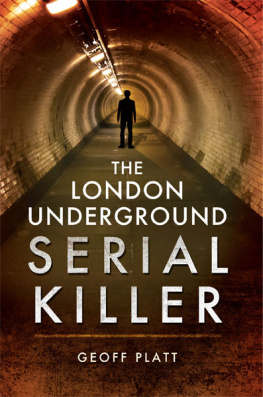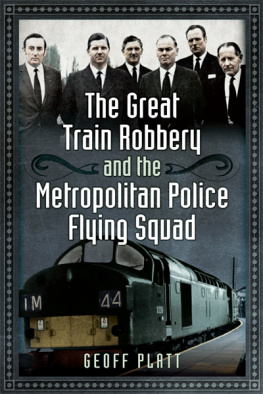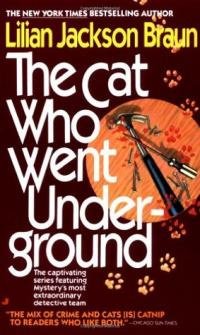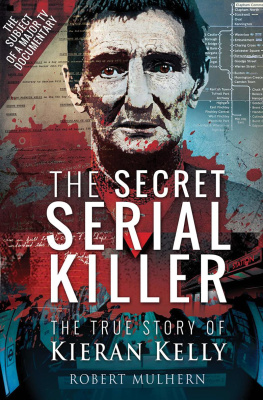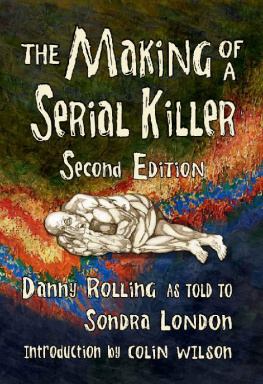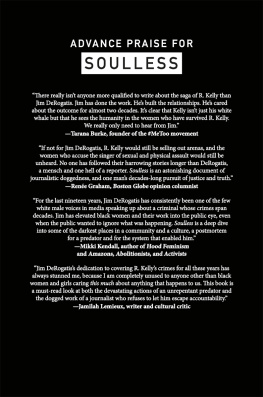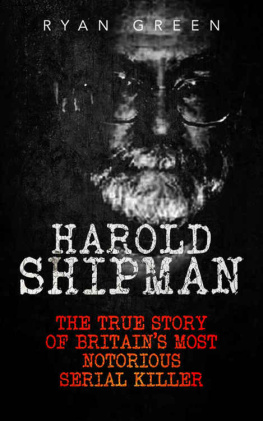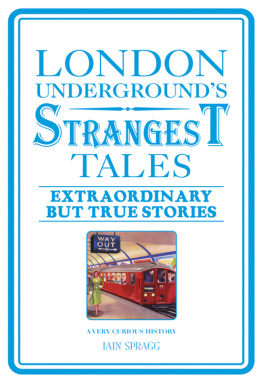

First published in Great Britain in 2015 by
Pen & Sword True Crime
an imprint of
Pen & Sword Books Ltd
47 Church Street
Barnsley
South Yorkshire
S70 2AS
Copyright Geoff Platt 2015
ISBN 978 1 47382 732 5
eISBN 9781473858299
The right of Geoff Platt to be identified as the Author of this Work has been asserted by him in accordance with the Copyright, Designs and Patents Act 1988.
A CIP catalogue record for this book is available from the British Library
All rights reserved. No part of this book may be reproduced or transmitted in any form or by any means, electronic or mechanical including photocopying, recording or by any information storage and retrieval system, without permission from the Publisher in writing.
Pen & Sword Books Ltd incorporates the imprints of Pen & Sword Archaeology, Atlas, Aviation, Battleground, Discovery, Family History, History, Maritime, Military, Naval, Politics, Railways, Select, Transport, True Crime, and Fiction, Frontline Books, Leo Cooper, Praetorian Press, Seaforth Publishing and Wharncliffe.
For a complete list of Pen & Sword titles please contact
PEN & SWORD BOOKS LIMITED
47 Church Street, Barnsley, South Yorkshire, S70 2AS, England
E-mail: enquiries@pen-and-sword.co.uk
Website: www.pen-and-sword.co.uk
Contents
C HAPTER 1
The Introduction
A recent visit to a local bookshop revealed the public interest in serial killers, their victims, their motives, and what separates them from ordinary people. At the end of the section on Crime, there are now rows and rows of books under the heading, True Crime. There are books written by psychologists, criminologists, sociologists and even some written by, or on behalf of, the persons convicted of these crimes, but there are few written by police officers. In fact, research now reveals that True Crime is the fastest-growing area in book sales.
Psychologists, criminologists and sociologists differentiate between mass killers, spree killers and serial killers. They are academics and like to have definitions to work by. A researcher investigating serial killers does not want to talk to mass killers or spree killers. If the definition of a serial killer is someone who has killed five people, then there is no point in talking to anyone who has killed two, three or four people as they will now be in prison, where they will be prevented from ever killing a fifth person and thereby qualifying to be a serial killer.
In fact, the universal definition of a serial killer is Someone who has been convicted of five or more murders. This means that academics have to wait until after the trial so that they can classify the killers before talking to them, but by that time the killers have regained their self-control, their self-assurance and usually, their silence. They are then very likely to be detained in a prison or a mental hospital and they may very well be taking pills to make them more manageable.
Authors and journalists sell their wares on sensationalism. Serial killer is an emotive term that arouses our interest. Some researchers have claimed to have identified as many as sixty serial killers in the United Kingdom, but according to a strict classification there are only eleven:
Robert Black (active between 1969 and 1986)
John Childs (active between 1974 and 1978)
Kenneth Erskine (active in 1988)
John George Haigh (active between 1940 and 1949)
Colin Ireland (active between 1990 and 1993)
Peter Thomas Anthony Manuel (active between 1956 and 1958)
Dennis Andrew Nilsen (active between 1978 and 1983)
Peter William Sutcliffe (active between 1976 and 1981)
Rosemary West (active between 1967 and 1979)
Steven Gerald James Wright (active in 2006)
Dr Harold Shipman (active between 1974 and 1998)
The most startling omissions from this list are:
William Burke and William Hare (The Body Snatchers) (active between January and December 1828); Ian Brady and Myra Hyndley (The Moors Murderers) (active between 1963 and 1965); Frederick West (active from 1967 and 1979) (The Cromwell Street Killers) (although his wife Rosemary West is on the list)
The reasons for these omissions are that Hare was allowed to turn Kings Evidence against Burke and was not convicted of Murder. Brady and Hindley killed just four children and Fred West committed suicide whilst awaiting trial and was not, therefore, convicted.
These statistics are, like many statistics, affected by a range of factors that make them almost meaningless:
- The existence of the death penalty before 1965 meant that as soon as a person was convicted of their first Murder they were rushed off to the scaffold and executed within weeks, so that nobody was ever convicted of five Murders.
- People who do murder five people, have lost all respect for human life, including their own, and frequently commit suicide rather than face humiliation, conviction and life imprisonment.
- People who have murdered five people, know the best way to deal with witnesses.
- Trials are expensive and the DPP and the CPS usually stop prosecuting at two Murders. Therefore only those seeking infamy and who plead guilty are ever convicted of five Murders.
- Many serial killers are dealt with under Mental Health Act legislation and therefore avoid trial and conviction.
- For obvious reasons, many serial killers keep moving and move between criminal jurisdictions. When they are finally arrested the jurisdiction where they are arrested tends not to let them go, even for another trial in another jurisdiction.
Perhaps, in the light of these weaknesses, the definition of a serial killer needs to be re-written? Perhaps the fact that a Law Officer of the Crown has determined that there is sufficient evidence to justify charging a person with five Murders should be enough? There is certainly no reason why committing suicide whilst awaiting trial/ being sent to a mental institution/ pleading Not Guilty should allow a person to evade the list. If this data is going to assist psychologists, sociologists and criminologists to advise our politicians as to the best way to reduce serial killing, do we not owe it to ourselves to make the data that they work with more accurate, in order that their results are more accurate?
Kieran Patrick Kelly had killed his sixteenth and last victim in his cell at Clapham Police Station. Only ten minutes after he had killed, he was taken out of the cell and interviewed by two very senior officers in my presence. This is highly unusual, perhaps unique. Nobody else has ever spoken to a serial killer so soon after the moment he has killed. He was loaded with testosterone and adrenaline, mentally, physically and sexually aroused and could not stop talking about what he had done. He was asked if he had murdered his cellmate and he admitted that he had, and, unprompted, he then went on to admit that he had also previously killed fifteen other people. There being no evidence to support this claim, the police officers refused to accept his story and Kelly had to work very hard to convince them that he was telling the truth. He just kept talking
Over the next two years, Kelly was detained in solitary confinement in order to prevent him from killing any more cellmates. Almost the only person that he was allowed to speak to was me, Acting Detective Constable Geoff Platt, the officer selected to carry out the day-to-day investigation of the sixteen Murders that Kelly had admitted. Kelly had little choice about who he talked to, it was me or nobody.
Next page
